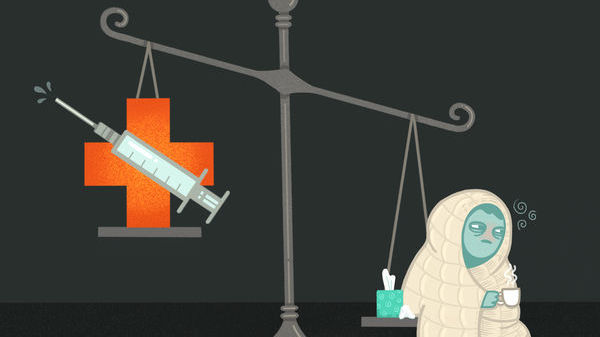
Last winter saw one of the most severe flu seasons in recent memory. According to the Centers for Disease Control and Prevention, nearly 1 million were hospitalized due to influenza-related symptoms and an estimated 80,000 people died — making the 2017–2018 season the deadliest in over a decade. CDC reports found that only 37 percent of Americans got vaccinated in 2017, a six percent drop from the previous year.
With peak flu season approaching, two faculty members from the College of Public Health share insights from their research experience and weigh in on the importance of getting a flu vaccination.
'... Not only about protecting ourselves'
Elizabeth Chmielewski-Yee, assistant professor of instruction in the Department of Epidemiology and Biostatistics
“As an epidemiologist, much of my research has focused on vaccines and vaccine-preventable diseases. In addition to working on clinical trials and vaccine safety, I’ve studied the effects of outbreaks—particularly meningococcal disease outbreaks on college campuses—and have seen how vaccines can be used to prevent the spread of infectious diseases. I therefore firmly believe in the importance of the influenza vaccine, in spite of the vaccine’s imperfections, because the flu is much more dangerous than most people realize. (Influenza and pneumonia are among the top ten causes of death in the United States.)
“When we get the flu vaccine, it is not only about protecting ourselves, but about protecting those we love—our family members, friends, neighbors and co-workers. Getting the vaccine can help prevent the spread of the illness to others at higher risk of complications from the flu, such as pregnant women, young children, the elderly and individuals with certain chronic diseases like asthma. I’ve already received my flu vaccine for this season, and I hope others will join me in getting vaccinated to help protect their loved ones and communities from this disease.”
'Fear, in general, is a powerful motivator'
Sarah Bauerle Bass, associate professor of Social and Behavioral Sciences and director of Temple’s Risk Communication Laboratory
“Risk communication is one way to understand why people don’t perceive that the flu is serious and don’t get vaccinated. Think about this: Are you more afraid of being eaten by a shark or getting the flu? The most feared deaths are ones that worry us the most. And if we don’t perceive that the flu can kill us, vaccination seems unnecessary. Fear, in general, is a powerful motivator; it’s a basic human emotion that protects us from danger.
“In the case of the flu, this risk perception may be affected because someone has never gotten the flu before and doesn’t fear getting it. People often operate under the concept of optimism bias, the idea that “it won’t happen to me,” which is affected by how much we do or do not perceive the threat to be risk. People usually underestimate risks if they believe themselves to be invulnerable. When we feel safe, we don’t feel obligated to do anything. On the other hand, fear can cause someone to overestimate their risk too. So risk communication experts have to figure out the best way to scare people just enough, to get them to dread the flu, but not scare them too much so they don’t do anything.”
